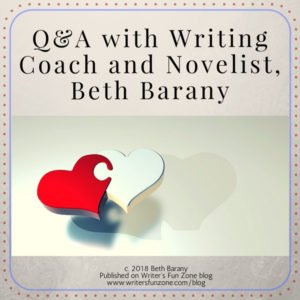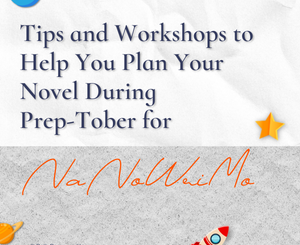Q&A with Writing Coach and Novelist, Beth Barany
 Recently I did an AMA feed, a Q&A service, and received over 30 questions about writing, editing, marketing, coaching writers, and the writers life.
Recently I did an AMA feed, a Q&A service, and received over 30 questions about writing, editing, marketing, coaching writers, and the writers life.
Here’s a few of the questions and their answers. If you have questions for me, you can post them in the comments below or email me directly. Thanks!
Q&A
ON WRITING
MONJY asked: Do you manage to write on daily basis? Also whats your best way to deal with writers block?
I write about 4-6 times per week, so not every day. I take at least one day off for my mental and emotional health.
My best way to deal with writer’s block is to set the timer for 10 or 20 minutes and write just 500 words, at least. I always ending up writing more, but on the few times I only get to my minimum, I still feel good.
The point is I create small wins. That way I feel good about coming back to my writing the next day.
I wrote a post about the cumulative power of writing one word at a day here:
SHEGIL asked: Are there any writing-related websites and / or books that you find useful?
I’m a big fan of these books: (in no particular order):
- The War of Art by Steven Pressfield
- Story Grid by Shawn Coyne
- The Writer’s Journey by Christopher Vogler
- GMC: Goal, Motivation, Conflict by Deb Dixon
- Writing Stories of Feminine Creative, Spiritual, and Sexual Awakening by Kim Hudson
- Wired for Story by Lisa Cron
- On Writing by Stephen King
- If You Want to Write by Brenda Ueland
As for websites, aside from my own, Writer’s Fun Zone, I also like:
I don’t read a lot of blog posts on writing, as I focus on teaching or my own writing. I prefer books for craft and other aspects of writing.
ON EDITING
MARIA1028 asked: What is your personal editing style?
I take a multi-layered approach to editing my writing.
For fiction, I write fairly quickly, after an organic process. (I teach that here.) So when it comes to editing, I do lots of passes.
In my first pass, I read the book on my e-reader, highlighting things and taking notes on things that stand out. Then I set the book aside for a while.
On my second pass, I print out about 30 pages at a time and hand-edit them for clarity, grammar, and add details or cut.
On my third pass, my husband reads aloud these pages to the both of us; he’s marking it up and I’m hearing things I missed. (Almost a two-fer!)
On the fourth pass, I input his edits, answering his questions and filling in things based on his suggestions and things I noticed.
Fifth pass: Then I send these approximately 30 pages to my Early Reader team and they send me notes, ranging from typos to story and character questions.
Sixth pass: I send these pages to my critique group of experienced writers who I’ve been with for over 10 years and get their awesome input.
Seventh pass: I sit with all these edits and make changes.
Eighth pass: I send the whole book to a Beta Reader team, people who haven’t seen the book before, and get their input. By this time, I’m pretty happy with the book and feel it’s nearly publishing ready.
Ninth pass: I make changes based on beta reader input and then I publish!
ON PUBLISHING
MARICELL asked: What method of publishing do you prefer: Self-publishing or through a publisher? What are the pros and cons?
I prefer self-publishing at this point. The pros and cons essentially boil down to who gets to make all the decisions and who is the investor for your book. In self-publishing, that’s you.
In traditional publishing, the publisher is the investor and gets most of the profits. You don’t get a say about the cover or marketing activities. You come to an agreement about editorial choices, but if you don’t come to an agreement, your work won’t be published.
Here’s an article on the pros and cons:
I created a free report here — you do need to sign up for it and can unsubscribe at any time:
https://writersfunzone.com/blog/self-publishing-vs-traditional-publishing-report/
ON BOOK MARKETING
Anonymous: Is it possible to promote a book without a budget or very little capital?
Absolutely!
All you need is the willingness to take some risks, experiment, and never give up!
ON WRITING COACHING
SWATIKAPOOR asked: In what specific ways does a writing coach help an author?
The specific ways will vary depending on the author’s concerns, challenges, and goals.
Here are some examples: One author wants to move forward on her book, but doesn’t know if what she’s written is any good. She’s passionate about her genre, but feels pulled in many directions. We talk; I hear her passion. I also understand that she wants to create something a bit different from the norm, and has no role models or any other writers around her who seem to understand her vision. She hires me; I read her work, and notice that her instincts are right on. She keeps writing, showing me pages each week. I give her feedback on what’s working and what I’d like to see more of.
Eventually she finishes her first draft and tells me that I helped her believe in herself, and that has made all the difference.
Another writer didn’t believe he had what it took to write write a novel, then finally did with the help of regular meetings with me where he had to turn in pages. He also used my step-by-step planning course and writing support group to get his book finished.
Another writer wanted help brainstorming and getting asked questions she hadn’t thought of. So that’s what we did together. She’s now got a completed manuscript.
Another client wanted help getting an agent, so we worked together to perfect her pitch and query letter. Some months later she got an agent, then a publishing offer. She’s proud of the book that was published.
These are just some of the specific ways I help authors.
ALBATROSS asked: What is your approach in coaching other writers? Do you have a certain strategy you follow with all the writers you help?
My approach varies greatly depending on the needs of the writer.
So my strategy is to have an in-depth conversation to discover what each writer needs and wants.
Then we want to work together, we see which of my programs or courses would be best for them.
To schedule your own Discovery Call, go here:
https://writersfunzone.com/blog/talk-to-a-writing-coach/
PRoadline asked: Does being a writing coach mean you are basically a sounding board to the other person where you brainstorm ideas together? What else is involved in the coaching process?
I replied: Lots more is involved, at least the way I do it. 🙂
Much of what I do is help writers get to know and then use their strengths, learn to trust those strengths, and to be okay with the things they aren’t strong in.
Once writers do the above, then they can focus on getting better at whatever it is they want to learn about writing, whether strengthening their craft, improving their writer habits, learning how to market and promote, or anything else.
Many writers come to me with tons of unconscious and conscious judgment about how they write. That judgement gets in the way of the work of being a writer.
It’s hard to be a writer when you’re constantly judging every word you write or you’re afraid of the reception of your work.
I go more into these fears in this article and accompanying free webinar (replay) here.
***
Read my full Author AMA questions and answers here:
***
Questions for me? Post them in the comments below or email me directly. Thanks!
***
ABOUT BETH
 Hi! I’m Beth Barany, an award-winning novelist, master neurolinguistic programming practitioner, and certified creativity coach for writers.
Hi! I’m Beth Barany, an award-winning novelist, master neurolinguistic programming practitioner, and certified creativity coach for writers.
Through my courses, programs, workshops and consultations, I specialize in helping writers experience clarity, so they can write, revise, and proudly publish their novels to the delight of their readers.
All my courses are packed with useful hands-on information that you can implement right away. I run an online school for fiction writers here and a 12-month group coaching program to help novelists get published here. I also offer consultations for writers here.



